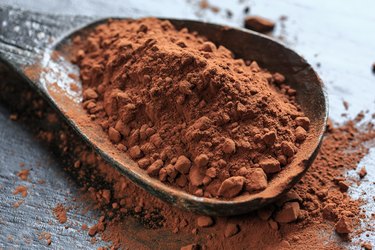
If you have diabetes and love chocolate, here's some good news: Unsweetened cocoa powder won't spike your blood sugar or glucose levels. Cocoa may even protect your heart, according to a growing body of research.
It's not just any cocoa or cocoa powder that provides such beneficial effects. "It has to be 100 percent unsweetened cocoa or cocoa powder," says Avigdor Arad, PhD, an instructor of medicine, endocrinology, diabetes and bone disease at the Icahn School of Medicine at Mount Sinai in New York City.
Video of the Day
Video of the Day
About Unsweetened Cocoa
Unsweetened cocoa or cacao powder contains very little sugar and is mostly made up of fiber, Arad explains. Cacao is the name for the seed of a South American evergreen tree used to make cocoa.
Unsweetened cocoa or cacao powder is also very low on the glycemic index (GI), Arad says. The GI is a value assigned to foods based on how slowly or quickly they cause increases in blood sugar levels, . Foods that rank high on the GI cause rapid blood sugar spikes, while those low on the GI, such as unsweetened cocoa or cacao powder, keep blood sugar levels stable.
Other foods that are low on the GI include apples, Greek yogurt and peanuts, says the Academy of Nutrition and Dietetics. By contrast, high GI foods include pretzels, white rice, white bread and potatoes, notes the American Diabetes Association.
When blood sugar levels are too high, diabetes-related complications can occur. Tight blood sugar control is the cornerstone of diabetes care. The goal is to keep blood glucose at about 80 to 130 milligrams per deciliter of blood before a meal and less than 180 milligrams per deciliter about two hours after a meal, according to the National Institute of Diabetes and Digestive and Kidney Diseases.
When choosing unsweetened cocoa or cacao powder, Arad says it's important to "read the food label and make sure there are no added sugars or sugar alcohols, and choose only 100 percent cacao."
Diabetes Prevention and Cocoa
Some research suggests that eating a small amount of dark chocolate each day could help prevent diabetes and insulin resistance. The study, published in the British Journal of Nutrition in May 2016, found that people who ate a chocolate bar a day showed reduced insulin resistance as well as improved liver enzymes. The liver regulates blood sugar, and "insulin resistance is a precursor to diabetes," Arad says.
It could be that eating chocolate every day is a marker for a healthy lifestyle. Study participants who ate chocolate daily were younger, exercised more and had higher levels of education than those who didn't consume chocolate each day.
There's more: Chocolate — particularly dark chocolate — is loaded with antioxidants called flavanols that may lower blood pressure, improve blood cholesterol levels and boost the elasticity of blood vessels, according to another British Journal of Nutrition study, this one published in October 2015.
High blood pressure and cholesterol, along with a reduced blood flow due to constricted vessels, are major risk factors for heart disease, according to the American Heart Association. This is important because adults with diabetes are two to four times more likely to die from heart disease than adults who don't have diabetes, the association points out.
Enjoying Chocolate With Diabetes
As with all things, moderation is key when it comes to satisfying your taste for chocolate, says Dana Greene, RD, a dietitian in Brookline, Massachusetts. "Choose dark chocolate over milk chocolate," she suggests, "but remember that even dark chocolate has calories and sugar."
The best way to keep your blood sugar levels in check, Greene says, is to work with a registered dietitian or certified diabetes educator (CDE) and test your glucose levels regularly. "Your RD or CDE can help you find, and stick with, an eating plan that works best for your life and lifestyle and allows you to maintain a normal weight," she says.
Read more: Is There Caffeine in Cocoa Powder?
- Avigdor Arad, PhD, instructor of medicine, endocrinology, diabetes and bone disease, Icahn School of Medicine at Mount Sinai, New York City
- National Institute of Diabetes and Digestive and Kidney Diseases: "Managing Diabetes"
- Academy of Nutrition and Dietetics: "What Is Glycemic Index?"
- British Journal of Nutrition: "Daily Chocolate Consumption Is Inversely Associated With Insulin Resistance and Liver Enzymes in the Observation of Cardiovascular Risk Factors in Luxembourg Study"
- British Journal of Nutrition: "Cocoa Flavanol Intake Improves Endothelial Function and Framingham Risk Score in Healthy Men and Women: A Randomized, Controlled, Double-Masked Trial: The Flaviola Health Study"
- American Heart Association: "Cardiovascular Disease and Diabetes"
- Dana Greene, RD, Brookline, Massachusetts
- American Diabetes Association: "Glycemic Index and Diabetes"
Is this an emergency? If you are experiencing serious medical symptoms, please see the National Library of Medicine’s list of signs you need emergency medical attention or call 911.